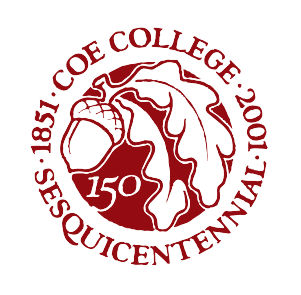 Coe College Tree Archive
Coe College Tree Archive
About
The Coe College Tree Archive is an online record of trees on the west side of Coe College’s campus. By creating an online archive, the project attempts to collect valuable environmental data, promote engagement with Coe’s urban forest, and ultimately shape how the Coe community views its trees. The online archive features interactive maps, profiles of Coe’s trees, environmental benefit estimates, tips for tree identification at Coe, and opportunities to contribute to the archive.
How to Use the Archive
Explore Whether you’re interested in learning more about identifying local trees or are curious about just one tree, the Coe College Tree Archive offers several opportunities to engage with the trees around campus.
- Navigate the trees of Coe College using the campus tree map
- Search for trees by their ID number or species on the tree profiles page
- Try identifying trees yourself with the help of the project’s guide to tree identification
Study Collecting and storing records on Coe’s urban forest are an integral part of the project’s mission, and for those interested, the archive makes these records readily available.
- Download the tree data in convenient formats for analyzing and mapping
- View the data and code used to build the archive on the project’s GitHub repository
- Read the full tree reports generated by i-Tree Eco
Contribute The archive works better when everyone in the Coe community can participate in its development. Consider learning more about the ways that you can add to the archive yourself or get connected with local tree-centered causes.
- Send in observations, photos, stories, or whatever you’re willing to add to the archive
- Learn more about opportunities to get connected in local environmental efforts
Guiding Principles
Trees are a Part of Our College Identity
Trees—particularly Oak trees—have long been an important part of the identity of Coe College. The College’s yearbook, which ran from 1903 through 2007, was called The Acorn. Likewise, the College’s sesquicentennial logo features an acorn and Oak leaves. The 2020 derecho reminded us of both the importance of our tree life on Coe’s campus and the fragility of our tree life in the face of elevated climate risks. Recognizing that trees are both vital to our community identity and under threat, the Coe College Tree Archive seeks to preserve records and stories of our trees. In doing so, the archive solidifies trees and our natural environment as an integral part of the College’s identify by recognizing the history of our trees as worthy of archiving alongside other aspects of our history.

Our Environment is Mutable
Humanity has demonstrated a remarkable ability to transform the planet. While we often see the ways people have used this power of transformation to cause environmental degradation, it is also important to highlight the ways that we all can use this power to give back to our environment. The Coe community has tremendous agency over the urban forest on campus. We should take comfort in the opportunities we have to give back to our communities through nature.

Planting Trees Will Not Save the World—But It Can Benefit Someone
Although we should not underestimate the power each of us has to change the world, we must also acknowledge that climate change, environmental injustice, and the degradation of the natural world are not issues any of us can resolve individually. We cannot plant enough trees to save the world.
Still, trees provide tangible benefits to our local community. The project encourages all of us to find ways we can make piecemeal efforts to improve the quality of the environments we inhabit. Whether it’s by volunteering with environmental groups, sharing our financial resources, speaking up for environmental causes, or of course, planting trees, the efforts we make today to improve our local environment can benefit our community in meaningful ways for generations. The Coe College Tree Archive seeks to illustrate this point by celebrating not only our trees but the staff, students, faculty, and alumni who have invested in the future of our campus by planting trees.
Project Background
The Coe College Tree Archive originated in Dr. Allison Carr’s Environmental Rhetoric class. Dr. Carr challenged students in her class to find creative ways they could connect with nature and environmentalism in everyday life. Although the original project focused on observing trees for purely the intrinsic benefit, the opportunity to preserve the record of the College’s trees in an accessible format became more apparent as it progressed and motivated the Coe College Tree Archive. Similar efforts by others, like Dr. Marta Wells of Yale Nature Walk, helped to push the effort into its current form. This project has benefited from the invaluable feedback of other students in Dr. Carr’s Fall 2022 Environmental Rhetoric class.
The Coe College Tree Archive was created by Evan Perry (Economics & Math, ’23), a student in Dr. Carr’s Fall 2022 Environmental Rhetoric class. Evan is currently a PhD student studying Environmental Economics at the Yale School of the Environment. If you are interested in helping to maintain or expand the archive, please contact Evan by emailing coe.tree.archive@gmail.com or evan.perry@yale.edu.
